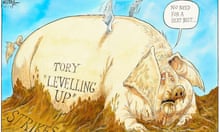A government watchdog led by the Bank of England’s chief economist has said Boris Johnson’s plans for “levelling up” Britain are unlikely to succeed because they rely too heavily on infrastructure spending and one-off funding schemes controlled from Westminster.
Pouring cold water on the prime minister’s election promise to rebalance Britain’s regionally lopsided economy, the Industrial Strategy Council (ISC) said the levelling-up agenda risked failure even though its ambitions were vague and would struggle to stand up to scrutiny.
The council – a group of influential business leaders led by the Bank of England’s chief economist, Andy Haldane – said a “comprehensive reorientation” was necessary for success and it should prioritise putting more spending decisions into the hands of local communities.
The warning, contained in the ISC’s final annual report, comes after ministers announced plans to scrap the council at the end of the month and replace it with its “build back better” plan for growth.
Speaking at an event hosted by the Institute for Government on Tuesday, Haldane said: “You don’t level up from the top down. Rather you level up from the bottom up.”
The council said the plan appeared “over-reliant on infrastructure spending and the continued use of centrally controlled funding pots thinly spread across a range of initiatives. Evidence, historical and international, suggests this is unlikely to be a recipe for success.”
The ISC was launched by Theresa May in 2017 as the Tories’ flagship vehicle for boosting UK productivity and regional prosperity. It counts some well-known business figures among its members, including Archie Norman, the Marks & Spencer chairman, Sir Charlie Mayfield, the former chair of the John Lewis Partnership, and the homewares entrepreneur Emma Bridgewater.
A government spokesperson said a shift in approach was appropriate because the economy had changed since 2017. “That’s why our new plan for growth sets out the opportunities we’ll seize across the UK to drive economic growth, create jobs and support British industry as we level up and build back better out of this pandemic.”
However, leaders of business and industry said the move raised serious questions over the government’s ambitions for the post-Covid recovery and its target to hit net zero carbon emissions by 2050.
In its annual report, the ISC said the new plan built on the work of the industrial strategy. However, it warned there were several key areas where the plan for growth lacked ambition, and called for the creation of a new independent body to evaluate the government’s progress.
Although welcoming the prime minister’s 10-point plan for a green industrial revolution as progress, it warned this was still “not yet a practical roadmap for delivering net zero, with several areas at present lacking the required scale to make progress at the required speed”.
Reserving the sharpest criticism for the levelling-up agenda, the council said the plan did not include any success criteria, making it difficult to judge if the scale or scope of existing initiatives was adequate.
It said the focus on transport infrastructure was by itself positive, but was also “clearly only one foundation of success for ‘left behind’ places” which also needed more investment in skills and support for communities, businesses and workers.
The council said that while billions of pounds in funding pots for local areas – including the Towns Fund and Levelling Up Fund – could have a positive impact, communities would benefit more from local spending decisions rather than the competitive-bid system built by central government.
Calling for the government to publish its repeatedly delayed devolution white paper, it said centrally controlled funding schemes “generate a potentially unlevel playing field, disadvantaging those areas with least capacity and capability to mount a successful bid.”
The warning comes after the government faced accusations of “pork barrel politics” earlier this month, when the chancellor, Rishi Sunak, allocated billions of pounds at the budget to levelling-up funds expected to disproportionately benefit Tory-voting areas.










